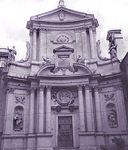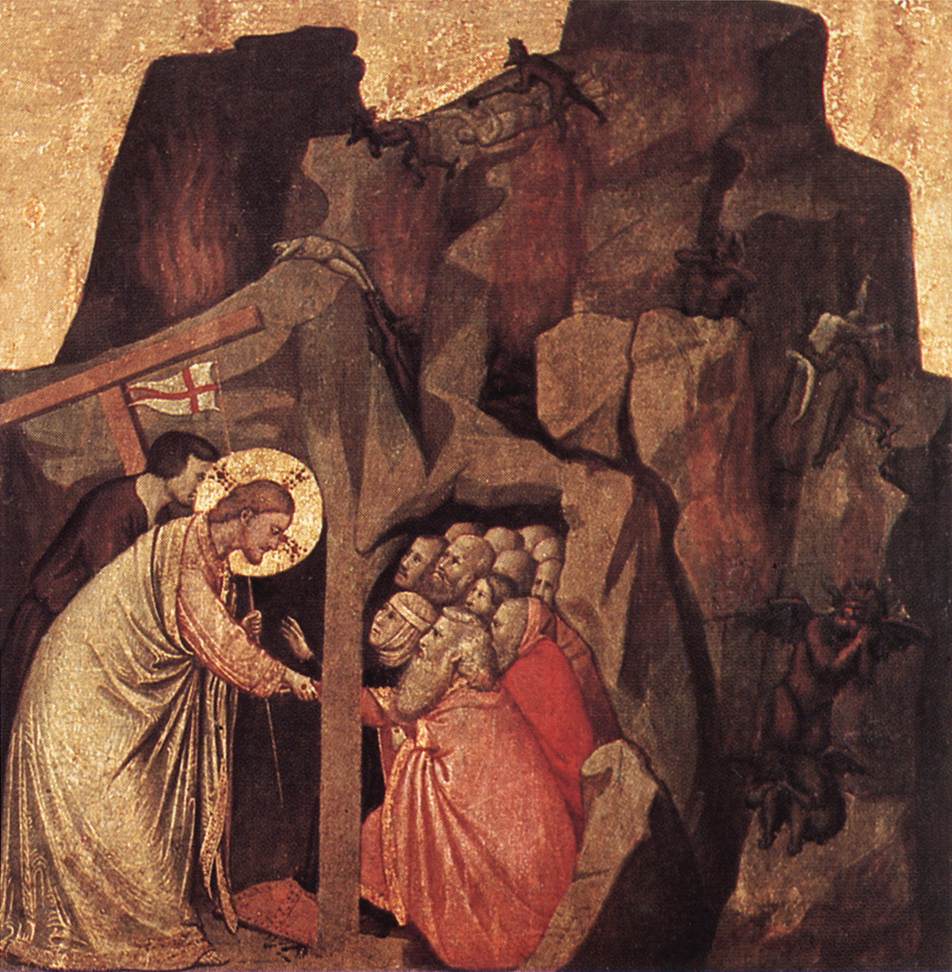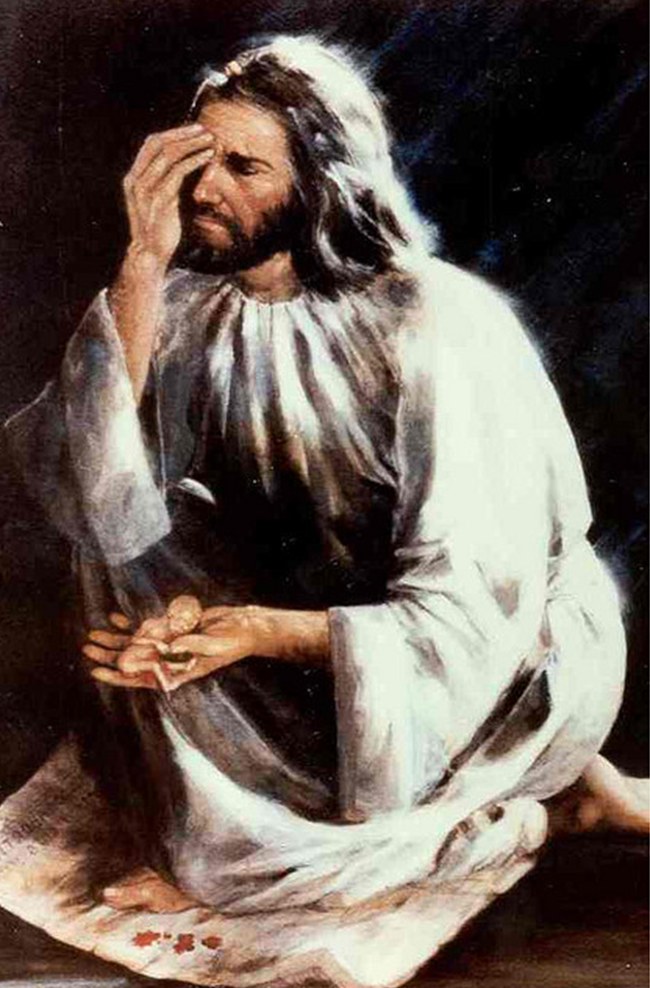31. Then said Jesus to those Jews which believed in him, If you continue in my word, then are you my disciples indeed;
32. And you shall know the truth, and the truth shall make you free.
33. They answered him, We be Abraham's seed, and were never in bondage to any man: how say you, you shall be made free?
34. Jesus answered them, Verily, verily, I say to you, Whosoever commits sin is the servant of sin.
35. And the servant abides not in the house for ever: but the Son abides ever.
36. If the Son therefore shall make you free, you shall be free indeed.
CHRYS. Our Lord wished to try the faith of those who believed, that it might not be only a superficial belief: Then said Jesus to those Jews which believed in Him, If you continue in My word, then are you My disciples indeed. His saying, if you continue, made it manifest what was in their hearts. He knew that some believed, and would not continue. And He makes them a magnificent promise, viz. that they shall become His disciples indeed; which words are a tacit rebuke to some who had believed and afterwards withdrawn.
AUG. We have all one Master, and are fellow disciples under Him. Nor because we speak with authority, are we therefore masters; but He is the Master of all, Who dwells in the hearts of all. It is a small thing for the disciple to come to Him in the first instance: he must continue in Him: if we continue not in Him, we shall fall. A little sentence this, but a great work; if you continue. For what is it to continue in God's word, but to yield to no temptations. Without labor, the reward would be gratis; if with, then a great reward indeed.
And you shall know the truth.
AUG. As if to say: Whereas you have now belief, by continuing, you shall have sight. For it was not their knowledge which made them believe, but rather their belief which gave them knowledge. Faith is to believe that which you see not: truth to see that which you believe? By continuing then to believe a thing, you come at last to see the thing; i.e. to the contemplation of the very truth as it is; not conveyed in words, but revealed by light. The truth is unchangeable; it is the bread of the soul, refreshing others, without diminution to itself; changing him who eats into itself; itself not changed. This truth is the Word of God, which put on flesh for our sakes, and lay hid, not meaning to bury itself, but only to defer its manifestation, till its suffering in the body, for the ransoming of the body of sin, had taken place.
CHRYS. Or, You shall know the truth, i.e. Me: for I am the truth. The Jewish was a typical dispensation; the reality you can only know from Me.
AUG. Some one might say perhaps, And what does it profit me to know the truth? So our Lord adds, And the truth shall free you; as if to say, If the truth does not delight you, liberty, will. To be freed is to be made free, as to be healed is to be made whole. This is plainer in the Greek; in the Latin we use the word free chiefly in the sense of escape of danger, relief from care, and the like.
THEOPHYL. As He said to the unbelievers alone, You shall die in your sin, so now to them who continue in the faith He proclaims absolution.
AUG. From what shall the truth free us, but from death, corruption, mutability, itself being immortal, uncorrupt, immutable? Absolute immutability is in itself eternity.
CHRYS. Men who really believed could have borne to he rebuked. But these men began immediately to show anger. Indeed if they had been disturbed at His former saying, they had much more reason to be so now. For they might argue; If He says we shall know the truth, He must mean that we do not know it now: so then the law is a lie, our knowledge a delusion. But their thoughts took no such direction: their grief is wholly worldly; they know of no other servitude, but that of this world: They answered Him, We be Abraham's seed, and were never in bondage to any man. How say you then, we shall be made free? As if to say, They of Abraham's stock are free, and ought not to be called slaves: we have never been in bondage to any one.
AUG. Or it was not those who believed, but the unbelieving multitude that made this answer. But how could they say with truth, taking only secular bondage into account, that we have never been in bondage to any man? Was not Joseph sold? were not the holy prophets carried into captivity? Ungrateful people! Why does God remind you so continually of His having taken you out of the house of bondage if you never were in bondage? Why do you who are now talking, pay tribute to the Romans, if you never were in bondage?
CHRYS. Christ then, who speaks for their good, not to gratify their vainglory, explains His meaning to have been that they were the servants not of men, but of sin, the hardest kind of servitude, from which God only can rescue: Jesus answered them, Verily, verily, I say to you, Whosoever commits sin is the servant of sin.
AUG. This asseveration is important: it is, if one may say so, His oath. Amen means true, but is not translated. Neither the Greek nor the Latin Translator have dared to translate it. It is a Hebrew word; and men have abstained from translating it, in order to throw a reverential veil over so mysterious a word: not that they wished to lock it up, but only to prevent it from becoming despised by being exposed. How important the word is, you may see from its being repeated. Verily I say to you, says Verity itself; which could not be, even though it said not verily. Our Lord however has recourse to this mode of enforcing His words, in order to rouse men from their state of sleep and indifference. Whosoever, He said, commits sin, whether Jew or Greek, rich or poor, king or beggar, is the servant of sin.
GREG. Because whoever yields to wrong desires, puts his hitherto free soul under the yoke of the evil one, and takes him for his master. But we oppose this master, when we struggle against the wickedness which has laid hold upon us, when we strongly resist habit, when we pierce sin with repentance, and wash away the spots of filth With tears.
GREG. And the more freely men follow their perverse desires, the more closely are they in bondage to them.
AUG. O miserable bondage! The slave of a human master when wearied with the hardness of his tasks, sometimes takes refuge in flight. But whither does the slave of sin flee? He takes it along with him, wherever he goes; for his sin is within him. The pleasure passes away, but the sin does not pass away: its delight goes, its sting remains behind. He alone can free from sin, who came without sin, and was made a sacrifice for sin. And thus it follows: The servant abides not in the house for ever. The Church is the house: the servant is the sinner; and many sinners enter into the Church. So He does not say, The servant is, not in the house; but, The servant abides not in the house for ever. If a time then is to come, when there shall be no servant in the house; who will there be there? Who will boast that he is pure from sin? Christ's are fearful words. But He adds, The Son abides for ever. So then Christ will live alone in His house. Or does not the word Son, imply both the body and the head? Christ purposely alarms us first, and then gives us hope. He alarms us, that we may not love sin; He gives us hope, that we may not despair of the absolution of our sin. Our hope then is this, that we shall be freed by Him who is free. He has paid the price for us, not in money, but in His own blood: If the Son therefore shall make you free, you shall be free indeed.
AUG. Not from the barbarians, but from the devil; not from the captivity of the body, but from the wickedness of the soul.
AUG. The first stage of freedom' is, the abstaining from sin. But that is only incipient, it is not perfect freedom: for the flesh still lusts against the spirit, so that you do not do the things that you would. Full and perfect freedom will only be, when the contest is over, and the last enemy, death, is destroyed.
CHRYS, Or thus: Having said that whosoever commits sin, is the servant of sin, He anticipates the answer that their sacrifices saved them, by saying, The servant abides not in the house for ever, but the Son abides ever. The house, He says, meaning the Father's house on high; in which, to draw a comparison from the world, He Himself had all the power, just as a man has all the power in his own house. Abides not, means, has not the power of giving; which the Son, who is the master of the house, has. The priests of the old law had not the power of remitting sins by the sacraments of the law; for all were sinners. Even the priests, who, as the Apostle says, were obliged to offer up sacrifices for themselves. But the Son has this power; and therefore our Lord concludes: If the Son shall make you free, you shall be free indeed; implying that that earthly freedom, of which men boasted so much, was not true freedom.
AUG. Do not then abuse your freedom, for the purpose of sinning freely; but use it in order not to sin at all. Your will will be free, if it be merciful: you will be free, if you become the servant of righteousness.
37. I know that you are Abraham's seed; but you seek to kill me, because my word has no place in you.
38. I speak that which I have seen with my Father: and you do that which you have seen with your father.
39. They answered and said to him, Abraham is our father. Jesus said to them, If you were Abraham's children, you would do the works of Abraham.
40. But now you seek to kill me, a man that has told you the truth, which I have heard of God: this did not Abraham.
41. You do the deeds of your father.
AUG. The Jews had asserted they were free, because they were Abraham's seed. Our Lord replies, I know that you are Abraham's seed; as if to say, I know that you are the sons of Abraham, but according to the flesh, not spiritually and by faith. So He adds, But you seek to kill Me.
CHRYS. He says this, that they might not attempt to answer, that they had no sin. He reminds them of a present sin; a sin which they had been meditating for some time past, and which was actually at this moment in their thoughts: putting out of the question their general course of life. He thus removes them by degrees out of their relationship to Abraham, teaching them not to pride themselves so much upon it: for that, as bondage and freedom were the consequences of works, so was relationship. And that they might not say, We do so justly, He adds the reason why they did so; Because My word has no place in you.
AUG. That is, has not place in your hearts, because your heart does not take it in. The word of God to the believing, is like the hook to the fish; it takes when it is taken: and that not to the injury of those who are caught by it. They are caught for their salvation, not for their destruction.
CHRYS He does not say, you do not take in My word, but My word has not room in you; showing the depth of His doctrines. But they might say; What if you speak of yourself? So He adds, I speak that which I have seen of My Father; for I have not only the Father's substance, but His truth.
AUG. Our Lord by His Father wishes us to understand God: as if to say, I have seen the truth, I speak the truth, because I am the truth. If our Lord then speaks the truth which He saw with the Father, it is Himself that He saw, Himself that He speaks; He being Himself the truth of the Father.
ORIGEN. This is proof that our Savior was witness to what was done with the Father: whereas men, to whom the revelation is made, were not witnesses.
THEOPHYL. But when you hear, I speak that which I have seen, do not think it means bodily vision, but innate knowledge, sure, and approved. For as the eyes when they see an object, see it wholly and correctly; so I speak with certainty what I know from My Father.
And, you do that which you have seen with your father.
ORIGEN. As yet He has not named their father; He mentioned Abraham indeed a little above, but now He is going to mention another father, viz. the devil: whose sons they were, in so far as they were wicked, not as being men. Our Lord is reproaching them for their evil deeds.
CHRYS. Another reading has, And do you do that which you have seen with your father; as if to say, As I both in word and deed declare to you the Father, so do you by your works show forth Abraham.
ORIGEN. Also another reading has; And, do you do what you have heard from the Father. All that was written in the Law and the Prophets they had heard from the Father. He who takes this reading, may use it to prove against them who hold otherwise, that the God who gave the Law and the Prophets, was none other than Christ's Father. And we use it too as an answer to those who maintain two original natures in men, and explain the words, My word has no place in you, to mean that these were by nature incapable of receiving the word. How could those be of an incapable nature, who had heard from the Father? And how again could they be of a blessed nature, who sought to kill our Savior, and would not receive His words. They answered and said to Him, Abraham is our father. This answer of the Jews is a great falling off from our Lord's meaning. He had referred to God, but they take Father in the sense of the father of their nature, Abraham.
AUG. As if to say, What are you going to say against Abraham? They seem to be inviting Him to say something in disparagement of Abraham; and so to give them an opportunity of executing their purpose.
ORIGEN. Our Savior denies that Abraham is their father: Jesus said to them, If you were Abraham's children, you would do the works of Abraham.
AUG. And yet He says above, I know that you are Abraham's seed. So He does not deny their origin, but condemns their deeds. Their flesh was from him; their life was not.
ORIGEN. Or we may explain the difficulty thus. Above it is in the Greek, I know that you are Abraham's seed. So let us examine whether there is not a difference between a bodily seed and a child. It is evident that a seed contains in itself all the proportions of him whose seed it is, as yet however dormant, and waiting to be developed; when the seed first has changed and molded the material it meets within the woman, derived nourishment from thence and gone through a process in the womb, it becomes a child, the likeness of its begetter. So then a child is formed from the seed: but the seed is not necessarily a child. Now with reference to those who are from their works judged to be the seed of Abraham, may we not conceive that they are so from certain seminal proportions implanted in their souls? All men are not the seed of Abraham, for all have not these proportions implanted in their souls. But he who is the seed of Abraham, has yet to become his child by likeness. And it is possible for him by negligence and indolence even to cease to be the seed. But those to whom these words were addressed, were not yet cut off from hope: and therefore Jesus acknowledged that they were as yet the seed of Abraham, and had still the power of becoming children of Abraham. So He says, If you are the children of Abraham, do the works of Abraham. If as the seed of Abraham, they had attained to their proper sign and growth, they would have taken in our Lord's words. But not having grown to be children, they cared not; but wish to kill the Word, and as it were break it in pieces, since it was too great for them to take in. If any of you then be the seed of Abraham, and as yet do not take in the word of God, let him not seek to kill the word; but rather change himself into being a son of Abraham, and then he will be able to take in the Son of God. Some select one of the works of Abraham, viz. that in Genesis, And Abraham believed God, and it was counted to him for righteousness. But even granting to them that faith is a work, if this were so, why was it not, Do the work of Abraham: using the singular number, instead of the plural? The expression as it stands is, I think, equivalent to saying, Do all the works of Abraham: i.e. in the spiritual sense, interpreting Abraham's history allegorically. For it is not incumbent on one, who would be a son of Abraham, to marry his maidservants, or after his wife's death, to marry another in his old age.
But now you seek to kill Me, a man that has told you the truth.
CHRYS. This truth, that is, that He was equal to the Father: for it was this that moved the Jews to kill Him. To show, however, that this doctrine is not opposed to the Father, He adds, Which I have heard from God.
ALCUIN. Because He Himself, Who is the truth, was begotten of God the Father, to hear, being in fact the same with to be from the Father.
ORIGEN. To kill Me, He says, a man. I say nothing now of the Son of God, nothing of the Word, because the Word cannot die; I speak only of that which you see. It is in your power to kill that which you see, and offend Him Whom you see not.
This did not Abraham.
ALCUIN. As if to say, By this you prove that you are not the sons of Abraham; that you do works contrary to those of Abraham.
ORIGEN. It might seem to some, that it were superfluous to say that Abraham did not this; for it were impossible that it should be; Christ was not born at that time. But we may remind them, that in Abraham's time there was a man born who spoke the truth, which he heard from God, and that this man's life was not sought for by Abraham. Know too that the Saints were never without the spiritual advent of Christ. I understand then from this passage, that every one who, after regeneration, and other divine graces bestowed upon him, commits sin, does by this return to evil incur the guilt of crucifying the Son of God, which Abraham did not do.
You do the works of your father.
AUG. He does not say as yet who is their father.
CHRYS. Our Lord says this with a view to put down their vain boasting of their descent; and persuade them to rest their hopes of salvation no longer on the natural relationship, but on the adoption. For this it was which prevented them from coming to Christ; viz. their thinking that their relationship to Abraham was sufficient for their salvation.
41. Then said they to him, We be not born of fornication; we have one Father, even God.
42. Jesus said to them, If God were your Father you would love me: for I proceeded forth and came from God; neither came I of myself, but he sent me.
AUG. The Jews had begun to understand that our Lord was not speaking of sonship according to the flesh, but of manner of life. Scripture often speaks of spiritual fornication, with many gods, and of the soul being prostituted, as it were, by paying worship to false gods. This explains what follows: Then said they to Him, We be not born of fornication; we have one Father, even God.
THEOPHYL. As if their motive against Him was a desire to avenge God's honor.
ORIGEN. Or their sonship to Abraham having been disproved, they reply by bitterly insinuating, that our Savior was the offspring of adultery. But perhaps the tone of the answer is disputatious, more than any thing else. For whereas they have said shortly before, We have Abraham for our father, and had been told in reply, If you are Abraham's children, do the works of Abraham; they declare in return that they have a greater Father than Abraham, i.e. God; and that they were not derived from fornication. For the devil, who has no power of creating any thing from himself, begets not from a spouse, but a harlot, i.e. matter, those who give themselves up to carnal things, that is, cleave to matter.
CHRYS. But what say you? Have you God for your Father, and do you blame Christ for speaking thus? Yet true it was, that many of them were born of fornication, for people then used to form unlawful connections. But this is not the thing our Lord has in view. He is bent on proving that they are not from God. Jesus said to them, If God were your Father, you would love Me: for I proceeded forth and came from God.
HILARY. It was not that the Son of God condemned the assumption of so religious a name; that is, condemned them for professing to be the sons of God, and calling God the Father; but that He blamed the rash presumption of the Jews in claiming God for their Father, when they did not love the Son. For I proceeded forth, and came from God. To proceed forth is not the same with to come. When our Lord says that those who called God their Father, ought to love Him, because He came forth from God, He means that His being born of God was the reason why He should be loved: the proceeding forth, having reference to His incorporeal birth. Their claim to be the sons of God, was to be made good by their loving Christ, Who was begotten from God. For a true worshiper of God the Father must love the Son, as being from God. And he only can love the Father, who believes that the Son is from Him.
AUG. This then is the eternal procession, the proceeding forth of the Word from God: from Him. It proceeded as the Word of the Father, and came to us: The Word was made flesh. His advent is His humanity: His staying, His divinity. You call God your Father; acknowledge Me at least to be a brother.
HILARY. In what follows, He teaches that His origin is not in Himself; Neither came I of Myself, but He sent Me.
ORIGEN. This was said, I think, in allusion to some who came without being sent by the Father, of whom it is said in Jeremiah, I have not sent these prophets, yet they ran. Some, however, use this passage to prove the existence of two natures. To these we may reply, Paul hated Jesus when he persecuted the Church of God, at the time, viz. that our Lord said, Why persecute you Me? Now if it is true, as is here said, If God were your Father, you would love Me; the converse is true, If you do not love Me, God is not your Father. And Paul for some time did not love Jesus. There was a time when God was not Paul's father. Paul therefore was not by nature the son of God, but afterwards was made so. And when does God become any one's Father, except when he keeps His commandments?
Catena Aurea John 8

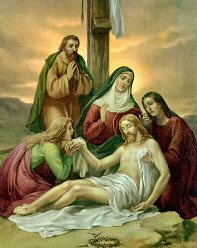
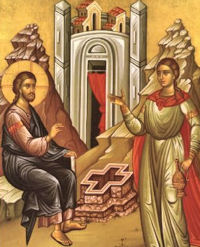 St. Photina was that Samaritan woman whom our Lord met at Jacob’s Well. When He disclosed the secret of her profligate life, she believed in Him at once as that Messiah which was to come, and began spreading the Gospel among the Samaritans, converting many. Later, she and her son Josiah and her five sisters went to Carthage to preach and then to Rome. Another son, Victor, was a soldier and had already come to Emperor Nero’s attention as being a Christian. The Emperor summoned the whole family and with threats and tortures tried to force them to renounce their faith in Jesus Christ. Meanwhile, when Nero’s daughter Domnina came in contact with Photina (the Lord Himself had given her the name, meaning “resplendent” or “shining with light”), she, too, was converted. The enraged emperor had the heads of the sons and sisters cut off; Photina was held in prison for a few more weeks before being thrown into a well, where she joyously gave her soul to the Lord.
St. Photina was that Samaritan woman whom our Lord met at Jacob’s Well. When He disclosed the secret of her profligate life, she believed in Him at once as that Messiah which was to come, and began spreading the Gospel among the Samaritans, converting many. Later, she and her son Josiah and her five sisters went to Carthage to preach and then to Rome. Another son, Victor, was a soldier and had already come to Emperor Nero’s attention as being a Christian. The Emperor summoned the whole family and with threats and tortures tried to force them to renounce their faith in Jesus Christ. Meanwhile, when Nero’s daughter Domnina came in contact with Photina (the Lord Himself had given her the name, meaning “resplendent” or “shining with light”), she, too, was converted. The enraged emperor had the heads of the sons and sisters cut off; Photina was held in prison for a few more weeks before being thrown into a well, where she joyously gave her soul to the Lord.